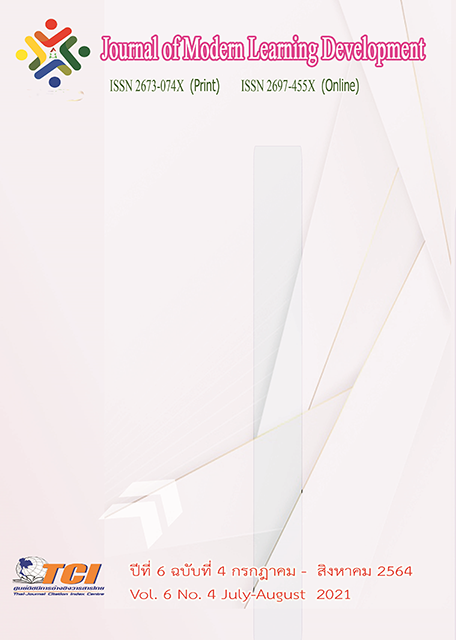Guidelines for Developing Digital Leadership for School Administrators Under the Office of Buriram Primary Educational Service Area Office 2
Main Article Content
Abstract
The objectives of the research were; 1) to study the current conditions, the desirable conditions and the needs of a leadership in the digital age for school administrators in the Buriram Primary Educational Service Area Office 2, and 2) to develop the guidelines for a leadership in the digital age for school administrators in the Buriram Primary Educational Service Area Office 2. The samples were 144 school administrators and the deputies in the Buriram Primary Educational Service Area Office 2. The samples were derived by stratified random sampling. The research tools were the rating-scale questionnaires 5 level, a semi-structured Interview form, and an assessment form of evaluating the guidelines. The statistics were analyzed by using mean and standard deviation.
The research results were as follow; the current conditions of a leadership in the digital age for school administrators in the Buriram Primary Educational Service Area Office 2 revealed that all and each component was at high level. The desirable conditions of a leadership in the digital age for school administrators revealed that all and each component was at the highest level. And the needs of a leadership in the digital age for school administrators, ordered from the most to least as to open for new knowledges and building a society of wisdom. For the guidelines of a leadership in the digital age for school administrators in the Buriram Primary Educational Service Area Office 2, the result of overall guidelines evaluation was highest level appropriate and the possibilities was at the highest level. For the guidelines, it consisted of 5 components and 29 guidelines which can included that the administrators have to having plans and guidelines of development people for building a society of wisdom. Making a policy for the people to get a chance to join the normal training course or the online course. Joining and supporting in using technology for professional development activities. Being a good role model in support and encourage to get the awareness in ethics for the evolution of the digital social culture in using an appropriate media.
Article Details
References
กรณัฏฐ์ ตาแปง. (2563). บทบาทภาวะผู้นำทางการศึกษาของผู้บริหารยุคดิจิทัล. วิทยานิพนธ์ปริญญาการศึกษามหาบัณฑิต. บัณฑิตวิทยาลัย: มหาวิทยาลัยพะเยา.
ทินกร บัวชู. (2563). ภาวะผู้นำดิจิทัลของผู้บริหารสถานศึกษา. วารสารครุศาสตร์สาร. คณะครุศาสตร์มหาวิทยาลัยราชภัฏบ้านสมเด็จเจ้าพระยา. 13 (2), 285-294
บุญชม ศรีสะอาด. (2560). การวิจัยเบื้องต้น. (พิมพ์ครั้งที่ 10). กรุงเทพมหานคร: สุวีริยาสาส์น จำกัด.
ประเวศน์ มหารัตน์สกุล. (2550). ภาวะผู้นำ : ความเป็นไปในสังคมไทยและวิธีการแก้ไข. กรุงเทพมหานคร: หมอชาวบ้าน.
ไพฑูรย์ สินลารัตน์. (2553). ผู้นําเชิงสร้างสรรค์และผลิตภาพ : กระบวนทัศน์ใหม่และผู้นําใหม่ทางการศึกษา. กรุงเทพมหานคร: โรงพิมพ์แห่งจุฬาลงกรณ์มหาวิทยาลัย.
มัทนา วังถนอมศักดิ์. (2550). รูปแบบแรงจูงใจในการปฏิบัติงาน. วิทยานิพนธ์ปรัชญาดุษฎีบัณฑิตสาขาการบริหารการศึกษา. บัณฑิตวิทยาลัย: มหาวิทยาลัยศิลปากร.
สุรีรัตน์ โตเขียว. (2560). รูปแบบภาวะผู้นำของผู้บริหารสถานศึกษาขั้นพื้นฐานในศตวรรษที่ 21. วิทยานิพนธ์ครุศาสตร์ดุษฎีบัณฑิตสาขาการบริหารการศึกษา. บัณฑิตวิทยาลัย: มหาวิทยาลัยราชภัฏนครสวรรค์.
สุวรรณา เทพประสิทธิ์. (2555). ความสัมพันธ์ระหว่างภาวะผู้นำแบบวิถีทาง-เป้าหมายของผู้บริหารกับประสิทธิผลของโรงเรียน. วิทยานิพนธ์ปริญญาศึกษาศาสตร์มหาบัณฑิต. บัณฑิตวิทยาลัย:มหาวิทยาลัยเทคโนโลยีราชมงคลธัญบุรี.
สงบ อินทรมณี. (2562). การบริหารสถานศึกษาในยุคดิจิทัล. วิทยานิพนธ์ปริญญาการศึกษามหาบัณฑิต. กรุงเทพมหานคร: สถาบันการจัดการปัญญาภิวัฒน์.
สำนักงานเขตพื้นที่การศึกษาประถมศึกษาบุรีรัมย์ เขต 2. (2560). แผนปฏิบัติงานประจำปี 2560. สำนักงานเขตพื้นที่การศึกษาประถมศึกษาบุรีรัมย์ เขต 2.
Polly, D. (2010). Preparing teachers to integrate technology effectively : The case of higher-order thinking skills (HOTS). Chapter to appear in S. D’Augustono (Ed.).


